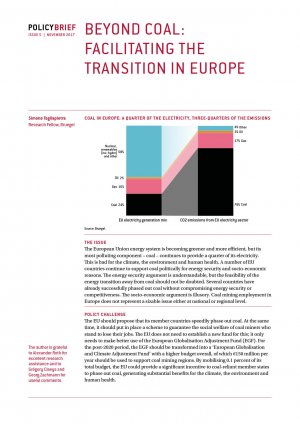Policy Brief
Beyond coal: facilitating the transition in Europe
Europe has a dirty energy secret: coal is producing a quarter of the electricity, but three-quarters of the emissions. The EU should propose that its member countries speedily phase out coal and put in place a scheme to guarantee the social welfare of coal miners who stand to lose their jobs, making a better use of the European Globalisation Adjustment Fund (EGF)
The issue
The European Union energy system is becoming greener and more efficient, but its most polluting component – coal – continues to provide a quarter of its electricity. This is bad for the climate, the environment and human health. A number of EU countries continue to support coal politically for energy security and socio-economic reasons. The energy security argument is understandable, but the feasibility of the energy transition away from coal should not be doubted. Several countries have already successfully phased out coal without compromising energy security or competitiveness. The socio-economic argument is illusory. Coal mining employment in Europe does not represent a sizable issue either at national or regional level.
Policy challenge
The EU should propose that its member countries speedily phase out coal. At the same time, it should put in place a scheme to guarantee the social welfare of coal miners who stand to lose their jobs. The EU does not need to establish a new fund for this; it only needs to make better use of the European Globalisation Adjustment Fund (EGF). For the post-2020 period, the EGF should be transformed into a ‘European Globalisation and Climate Adjustment Fund’ with a higher budget overall, of which €150 million per year should be used to support coal mining regions. By mobilising 0.1 percent of its total budget, the EU could provide a significant incentive to coal-reliant member states to phase out coal, generating substantial benefits for the climate, the environment and human health.













